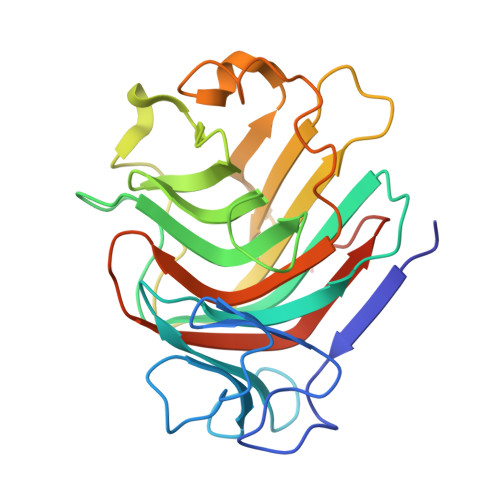Structural dissection of two redox proteins from the shipworm symbiont Teredinibacter turnerae.
Rajagopal, B.S., Yates, N., Smith, J., Paradisi, A., Tetard-Jones, C., Willats, W.G.T., Marcus, S., Knox, J.P., Firdaus-Raih, M., Henrissat, B., Davies, G.J., Walton, P.H., Parkin, A., Hemsworth, G.R.(2024) IUCrJ 11: 260-274
- PubMed: 38446458
- DOI: https://doi.org/10.1107/S2052252524001386
- Primary Citation of Related Structures:
8Q1V, 8Q1W, 8Q28, 8Q29, 8Q2A - PubMed Abstract:
The discovery of lytic polysaccharide monooxygenases (LPMOs), a family of copper-dependent enzymes that play a major role in polysaccharide degradation, has revealed the importance of oxidoreductases in the biological utilization of biomass. In fungi, a range of redox proteins have been implicated as working in harness with LPMOs to bring about polysaccharide oxidation. In bacteria, less is known about the interplay between redox proteins and LPMOs, or how the interaction between the two contributes to polysaccharide degradation. We therefore set out to characterize two previously unstudied proteins from the shipworm symbiont Teredinibacter turnerae that were initially identified by the presence of carbohydrate binding domains appended to uncharacterized domains with probable redox functions. Here, X-ray crystal structures of several domains from these proteins are presented together with initial efforts to characterize their functions. The analysis suggests that the target proteins are unlikely to function as LPMO electron donors, raising new questions as to the potential redox functions that these large extracellular multi-haem-containing c-type cytochromes may perform in these bacteria.
- Astbury Centre for Structural Molecular Biology and School of Molecular and Cellular Biology, Faculty of Biological Sciences, University of Leeds, Leeds LS2 9JT, United Kingdom.
Organizational Affiliation:

















